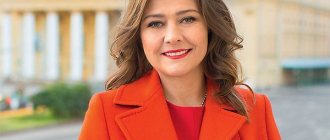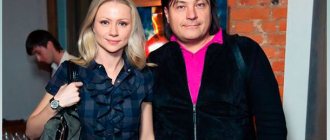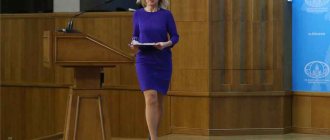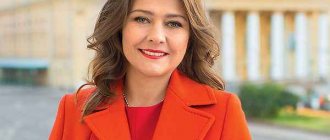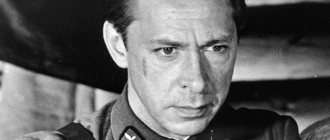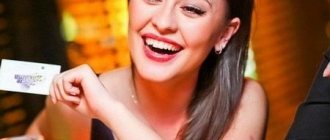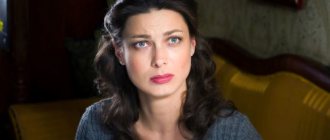Biography of Maria Kiseleva
Maria Kiseleva is a famous Russian synchronized swimmer, three-time Olympic champion, and recipient of honorary state awards. Popular TV presenter and journalist, “hostess” of the TV show “The Weakest Link”, organizer of spectacular water performances with the participation of athletes and artists. Public and statesman, President Putin’s confidant on issues of physical education and sports.
In the photo: Maria Kiseleva
Participation in television games
- “One Hundred to One” - member of the “Athletes” team ( issue dated June 24, 2000
) - “Big Races” - as part of the teams “Know Ours!”, “Lolita and Sons” and “Russian Team” ( issues dated September 30, October 14, November 25 and December 9, 2006
) - "Who want to be a millionaire?" — together with Ilya Averbukh, winning 200,000 rubles.
(
issue dated December 9, 2007
) - "Children's Pranks" ( May 30, 2009 episode
) - “You and I” - together with Vladimir Kirsanov, winning 240,000 rubles.
(
issue dated March 20, 2010
)
Childhood and family
The future Olympic champion was born on the Volga, in the city of Kuibyshev, which in 1991 was returned to its former name Samara. Her parents, Alexander Vladimirovich and Emilia Dmitrievna, met at the local aviation institute and studied in the same group. They were namesakes, and the woman did not even have to change her last name upon marriage. In 1971, the couple had their first child, Vladimir, and three years later, baby Mashenka was born.
Kiseleva Maria Alexandrovna
Until 1978, the family lived in Kuibyshev, then the father entered the Leningrad Military School, and the Kiselevs moved to the city on the Neva. Two years later, Alexander Vladimirovich was transferred to Moscow, and the family was again forced to settle into a new place.
In the capital, Masha went to first grade and began swimming with her brother. Unlike Volodya, going to the pool did not initially evoke positive emotions in her. The fact is that in early childhood the girl was terribly afraid of water and threw terrible hysterics when her parents tried to drag her into the sea during their summer vacation. At the same time, Maria was an active and lively child, she could not sit still for a second, and her irrepressible energy urgently needed to be channeled into useful channels.
Maria Kiseleva in childhood with her grandmother
Masha was too tall for gymnastics, ballet and figure skating didn’t work out either, so the only option left was swimming, especially since the pool was not far from home. To accustom the girl to water, she was first assigned to a small “paddling pool,” and only a few months later she was transferred to “big water.”
When Maria turned ten years old, the pool announced enrollment in a artistic swimming group. This sport was still completely new at that time, and the girl became curious to try herself in water dancing. In parallel with classes in the pool, young athletes learned choreography and even performed on stage in team concerts. Masha really liked all this; she had close friends on the team who helped her overcome her fear of water.
Maria Kiseleva in her youth
Kiseleva’s first coaches were Natalya Kiriakidi and Marina Dmitrieva, who managed to instill in the girl a love of synchronized swimming and awaken her sporting ambitions. Then Maria moved to the group of the honored synchronized swimmer Tatyana Khaitser, under whose leadership she became a candidate for master of sports and achieved impressive results.
After Tatyana Arkadyevna left, all promising girls (including Maria) were taken under the care of Nina Nikolaevna Kapkova, Honored Trainer of the Russian Federation. Under her leadership, Kiseleva became a master of sports and began competing for the youth team. For the sake of good results, the girl had to work hard - training sometimes lasted 8-10 hours a day, Masha barely had enough time for lessons and homework, and she had to completely forget about movies, dates with boys and other girlish pleasures.
Kapkova Nina Nikolaevna
In 1991, Kiseleva successfully graduated from the secondary art school, where she studied from the eighth grade, and became a student at the P.F. Institute of Physical Culture. Lesgafta. Soon the girls synchronized swimmers were offered to take part in a water show in France, and their team, almost in full, went abroad. The athletes earned good money, but training practically stopped. Maria decided to return to Moscow to try to realize her championship ambitions.
Sports achivments
After a year of training with a new personal trainer, Tatyana Danchenko, Maria joined the national team and won her first gold medal at the European Championships. Having become an international master of sports, she dropped out of college and devoted all her time to intensive training. The senior coach of the national team, Olga Vasilchenko, paired her with Elena Azarova, and Kiseleva got the opportunity to perform not only in a group, but also with an individual program.
Maria Kiseleva in the pool
At the same time, Maria was preparing to enter the Faculty of Journalism at Moscow State University - she was offended that the press paid so little attention to her favorite sport, and wanted to correct this injustice.
At the Summer Olympics in Atlanta (1996), the Russian team won fourth place - only group performances were included in the program, and Maria and Elena were never able to show their program. Soon after this, their duet broke up, and Kiseleva was paired with Olga Brusnikina, her main competitor, whose partner left the sport for health reasons.
Maria Kiseleva and Olga Brusnikina
From that moment on, a new round began in our heroine’s sports career. Maria transferred to the correspondence department and devoted herself entirely to training under the guidance of the Honored Trainer of the Russian Federation, Elena Polyanskaya. The girls were counted on as the best duet in Russia, and they fully lived up to the expectations placed on them.
In 1997, Kiseleva and Brusnikina became first at the World Cup in Guangzhou, China; Maria won another gold medal in group performances. In the same year, the girls brought two top awards from the European Championships in Seville.
Kiselev and Brusnikin in 1997
The next year began with Maria's triumphant performance at the World Championships in Australia, where she won two gold medals. They were followed by victories at the Goodwill Games in the United States and the European Cup in Prague. Synchronized swimming by Kiseleva and Brusnikina In 1999, the legendary Tatyana Pokrovskaya became the senior coach of the national team. She brought Russian synchronized swimmers to an unattainable level. Kiseleva and Brusnikina became the first Russian Olympic champions at the Summer Games in Sydney (2000), receiving a record number of points for the duet program and the highest marks for the group performance.
Sydney Olympics 2000
And this despite the fact that two months before the start of the Olympics, Maria did not pass a doping test, and her participation in the competition was in big doubt. The prohibited component was part of a dietary supplement for weight loss, which was recommended to the athlete by doctors. Kiseleva was disqualified for a month, but she managed to overcome a difficult psychological barrier, muster her will and show brilliant results at the competition.
In 2003, at the Games in Athens, Maria became an Olympic champion for the third time and decided to end her sports career. For her outstanding contribution to the development of Russian sports, she was awarded the Order of Honor and “For Services to the Fatherland”, IV degree, which were presented to her personally by President Vladimir Putin.
Maria Kiseleva. Motherhood changes lives
It’s not so often that people manage to achieve undeniable, striking success in two different professional fields at once. This is exactly what happened to Maria Kiseleva. A three-time Olympic champion in synchronized swimming, she, in parallel with her sports career, studied at the journalism department of Moscow State University and continued her career in television. We know her from sports news releases, the program “The Weakest Link,” and even from feature films: it fell to her to play Varvara Ivolgina in the film adaptation of F. M. Dostoevsky’s novel “The Idiot.” Our conversation with Maria Alexandrovna is about family and motherhood, about career and self-realization, about faith and the fashion for Orthodoxy.
It’s impossible to keep up with everything!
— Maria, I don’t know how noticeable this is for you, but from the moment children appeared in your family, your role began to change. As far as I know, you are participating in a project to create dialysis centers for children, this year you and your husband are preparing a sports performance for children... - In fact, the idea for a children's project was born even before our first daughter, Dasha, was born , but only this year the project finally matured. It's called "The Little Mermaid and the Pirates' Treasure." This is a fairy tale, a New Year's water performance, very interesting and colorful. As for dialysis centers, we are talking about the construction of such institutions for children with kidney failure in the regions. When I was offered to participate in it, I could not refuse. After all, this is truly a good cause! There is a Board of Trustees - a group of people who support and promote the project, travel to these centers, raise funds for them through charity concerts and presentations. Activities are scheduled according to the opening schedule of dialysis centers...
— Do you have the feeling that charity has become a kind of fashion for famous people? - Maybe yes. That's why I don't like to talk about her! It seems to me that in today's life there really is a need to help. This is fine. If I am invited to go to someone in need, to tell someone something, to give something as a gift, I never refuse. Moreover, we ourselves try to organize promotions and events. But I don’t think it’s necessary to trumpet about it, tell where we went, what exactly we did. For what? The people who are directly affected by this know everything - and enough. You come to these children, see their eyes, see how they react... This feeling of joy and happiness from the fact that they came to them, they were given attention - it will stay with them for a long time. Positive emotions and communication are important for both children and us! After all, they sit in the hospital as if in a prison: constantly in a limited space, in their own microcosm. And you can bring the joy of communication into this microcosm - and nothing supernatural is required from you. Just spend a day of your life! Indeed, time these days is worth its weight in gold, but in relation to what you give to children, it is such an insignificance. Yes, you cannot save the child, you cannot even perform an operation, but you can give him something, read something to him, talk to him - everything to the best of your ability. But the main thing is that you can...
— And yet, did the birth of your daughters somehow influence your desire to help, your attitude towards children in general, what you do, your life in general? “The fact that with the birth of children the worldview changes, if not turns upside down, is for sure. And until you become a mother yourself, it is very difficult to understand. Motherhood changes your priorities in life a lot. You begin to perceive everything related to children in a completely different way. You even look at other people’s kids on the street completely differently than before: how would my child behave? how would he react? You understand children more, you understand how you can interest them, how you can help...
— Nowadays the attitude towards having children is much more complicated than, say, 20 years ago. The ideology of childfree* appeared - a conscious refusal to have children. There is a popular opinion that a child is a sacrifice on oneself, one’s hobbies, one’s travels, one’s self-realization, so you can wait with this. How true is this in your opinion? - In what sense is the cross on oneself? Yes, of course, something has to be sacrificed. With the advent of our daughters, especially our second, my husband and I are much less able to go to the theater or restaurant. In almost five years since Dasha’s birth, my husband and I traveled together only twice - and then these were business trips, for three days. But is limiting entertainment a bad thing? Yes, you have to limit yourself, but is it possible to compare the happiness of communicating with a child with going to, say, a club? And then, we do not give birth to children in order to then reproach them for our “ruined” life and unrealized opportunities. This is not accounting, this is, first of all, joy! Maybe it doesn’t fit into someone’s head for the time being, but I am sure that any woman, consciously or not, strives to have a full-fledged family with children. And everyone solves the problem of lack of time differently: someone comes to the conclusion that it is better to stay at home and takes care of only the child; someone combines raising children with a career. Moreover, the decision depends on both the wife and the husband. I am for combination, and Volodya supports me.
Maria Kiseleva with her husband Vladimir Kirsanov and daughter. Photo "RIA Novosti"
No “forbidden” topics
— How unanimous are you and your husband, how serious are your disagreements? “It so happened that my husband and I have complete coincidences!” Volodya is a former swimmer, international master of sports. He, like me, studied at the Faculty of Journalism of Moscow State University. We met at an interuniversity swimming competition and got married 2 years later - on August 17, 2001. We have practically no “forbidden” topics, in which one of us understands very well, and the other understands nothing, which is interesting to one, but indifferent to the other, and therefore he listens only out of respect. In addition to work, we have a joint business - for seven years now we have been organizing the Show of Olympic Champions in Synchronized Swimming. Olga Brusnikina is participating in this project with us. Last year, Volodya and I created a new project “Reflection of the Stars” - it’s something at the intersection of sports and art: it includes music, poetry, and various sports. So we have a lot in common, and somehow we didn’t have to adapt to each other. Although in reality we are very different. I am a fairly calm, balanced, reserved person, and I can store emotions within myself for a long time. Volodya, on the contrary, is very impulsive, very energetic, explosive, but very quickly recovers from such “outbursts” and is incredibly kind. Therefore, there was and is a contrast. It smooths out a little over 11 years of communication - they say that a husband and wife even outwardly become similar over time! But precisely in everyday life there was no special “grinding in” - there was no need to invent something, to somehow adapt: they say, let you do this, and I’ll do it. Perhaps such a coincidence does not happen often. It's just a miracle that we met.
- Maybe it really is a miracle. Is it possible to rationally explain such harmony, do you think? “Maybe the fact is that in the families of our parents - both mine and my husband - everything turned out very similar. Our parents became for us the standard of family, an example of adequate, correct relationships. I lived in love, in happiness, in a complete, good, healthy and strong family. We always vacationed with our parents and brother. It has never happened that mom rests separately from dad or dad rests separately from mom. There were always common interests, our parents constantly came up with some kind of sports activities for us, some kind of intellectual entertainment, trips to the theater, seaside holidays, children's camps. Therefore, communication within the family was interesting. And then, we knew that we were not alone - we were together. So I absorbed family traditions from childhood, even, perhaps, without recording it. And when I started thinking about marriage, my desire was always to find that person with whom there would be the same complete mutual understanding and without whom I could not live. Volodya and I did not make any specific plans, did not set clear goals - we will do this this way, and we will do this that way. Everything developed very smoothly, naturally, when we got married.
— Haven’t professional sports and a career as a TV journalist encroached on this harmony? — If you set priorities, then for me family comes first, work comes second. I think this is normal for a woman. There is such a global trend: either give birth to a child early and then pursue a career, or vice versa, become professionally established and then think about family. In my opinion, it is stupid to follow any trends. You need to listen to yourself and follow your own path - everyone has their own. The main thing is not to miss the moment, to feel it. It seems to me that here you cannot predict or plan your life: husband, children - this is still given from above. Everything in my life came sequentially: sports, television, family. I didn’t have to work in two professions at the same time for very long, and besides, there were no children then. It happened several times that filming coincided with training. Then the coach and Olga Brusnikina, my partner, met me halfway: as a result, I disappeared all day on the set, and trained at night. It was a difficult moment. But there were few of them. And then sport was a priority for me.
- The choice in favor of sports - when was it initially made? — Initially, my parents sent me to synchronized swimming without any hopes of winning championship titles, but for the sake of development — I was 10 years old at the time. But when the question arose about serious training - twice a day, they were faced with a serious dilemma: after all, I studied very well at school, I finished sixth grade with excellent marks, and my parents understood that if I now went to a sports school, the emphasis will shift to sports. They couldn’t make a decision for a long time, and in the end they sent him to a sports school. I don't think they regretted it. I definitely didn't regret it.
— Has sport turned out to be an ideal field for you in all respects? - Despite the fact that in sport, of course, there is ambition and the desire to be the best, to be the first - otherwise you simply do not achieve any results - it also gives much more. First of all, I think that sport teaches you how to take a blow in life. You need to constantly be in shape, constantly be collected, no matter what happens: whether you succeed or not, you don’t show it, but, gritting your teeth, you go towards your goal. In life, this is sometimes necessary: to mobilize at the right moment, pull yourself together, be patient. I remember when we had filming from 9 am to 3 am. And you're in heels all day. It’s hard, but what to do? There is absolutely no way in life without trials.
— Constant competition, self-demandingness - don’t they instill in people a kind of rigidity and intransigence? — I wouldn’t talk about harshness. I have a lot of friends who are athletes, and as individuals they are all different: there are people who are very soft, and there are people who are very tough. Here a lot depends on the person himself and on his environment - coaches, team, on the atmosphere in the team.
Maria Kiseleva and Olga Brusnikina at the Summer Olympic Games in Beijing. PhotoXpress
Is there life after... sports?
— Why is it so difficult to leave sports? What is so addictive about it? — To achieve something in sports, you need to spend a lot of time. This is at least 10 years of daily hard physical work, when you deny yourself everything for the sake of results. Take it all and give it all up? And all your work, it turns out, was wasted?... And not only yours, but also those of many people who have invested in your progress all these years. Therefore, you stay as long as you feel your strength in this matter. In general, the most difficult moment for an athlete is just the end of a sports career, when life after sports begins. If you are not ready for it, then it is a disaster. In Soviet sports, unfortunately, very often there were tragedies, people broke down. Now this is less - athletes think more about their future lives. The most important thing, especially for those who have reached great heights, is to come down to earth in time, to find the strength to start from scratch in some business.
- It turned out differently for you, not from scratch... - Yes, it turned out differently for me. Sports helped me, when I was studying at the Faculty of Journalism at Moscow State University, to get an internship in the sports editorial office. Then a similar editorial office appeared on another channel - I was invited to work there. There the producer of the “Weak Link” program saw me. In “The Weakest Link,” noted director Vladimir Bortko, who liked the created image—by the way, it, like the idea of the program, first appeared on English television. Bortko decided that Varya Ivolgina, the heroine of his film “The Idiot,” should have just such an “iron” character. That’s how I ended up on the set, and I really liked it - it’s a completely different world! In general, one thing led to another. It seems to me that there is some kind of combination of happy coincidences and a serious attitude towards one’s work, a desire to work and improve. One cannot exist without the other. For me, sport became a stepping stone with the help of which I was able to move on. This often happens with athletes who have reached certain heights: you can push off from sports like a springboard, and then everything is in your hands. And if you just hang your legs and rest on your laurels, a miracle will not happen.
— Will it scare you if your children decide to go into professional sports? After all, you know from your own experience how difficult it is. - Yes, it’s hard. But if my children choose sports as a profession, my husband and I, of course, will not put a spoke in their wheels. Dasha is already doing rhythmic gymnastics and learning to swim. We want to show her several areas, and not only sports - music and painting. And then she will choose for herself, we will help her with this. We definitely decided that there should be sport in some form - for health, to instill discipline, self-organization, character, and determination.
— At the beginning of the conversation, you said that you don’t like to talk about charity. What about faith? “To be honest, I don’t really like and don’t know how to talk about this - it’s even somehow inconvenient to show what’s inside you.” Maybe I have the wrong perception, maybe the Soviet past left its mark on it, but I feel that faith in God is inside a person, it is something very sacred. When this is put on display, when they shout about it on every corner - I am a Christian! I go to Church! - It seems to me that something is wrong here. According to my feelings, real faith is still mainly in changing your behavior, in your lifestyle, in your actions. But you can only shout about your churchliness without having anything. Those close to me eventually came to the Church, although we had a completely Soviet family, we didn’t even think about faith, this topic was practically not raised. But over time, everything changed... My parents were baptized in adulthood. Volodya and I were baptized when we were already husband and wife. Dasha was baptized, Sasha is about to get ready. Today I have a completely different feeling than in those years: it’s somehow difficult to live without faith today. Looking back, maybe you don’t even understand how it was possible to live without faith, without any reference to God at all, without thinking about it? Although I am confused and I absolutely do not like the fashion for Orthodoxy: the fact that it has become fashionable to ostentatiously bless cars, offices, and so on. It’s closer to me to keep my faith in myself. Yes, of course, there is a sincere desire to personally share your thoughts with someone, to support a person, to help him with your faith, your experience of faith. In this case, there is probably no need to remain silent. But this is completely different...
*Childfree (eng. “childfree”) - free from children. - Ed.
Maria Alexandrovna Kiseleva
three-time Olympic champion in synchronized swimming. Member of the Public Chamber of the Russian Federation, member of the presidium of the Presidential Council for Physical Culture and Sports. Graduated from the Faculty of Journalism of Moscow State University. She began mastering her profession as a sports correspondent for NTV. She was a sports news presenter and, from 2001 to 2005, the host of the “Weak Link” program. In 2003, she starred in the film adaptation of F. M. Dostoevsky’s novel “The Idiot” (directed by Vladimir Bortko). Maria started synchronized swimming at the age of 10. After the Sydney Olympics in 2000, having won two golds, she left the sport. She returned two years later, before the Athens Olympics, at the peak of her television and film career. After performing in the group, she again brought home a gold medal. Married to Vladimir Kirsanov, producer, television journalist, graduate of the Faculty of Journalism of Moscow State University. The couple has two daughters: 5-year-old Daria and 6-month-old Alexandra.
Photo by Vladimir Eshtokin
"The Weakest Link" and other projects
While still a correspondence student at the Faculty of Journalism at Moscow State University, Maria got a job as a correspondent for the sports editorial office of the NTV channel and covered synchronized swimming competitions. In the spring of 2001, she became a sports news presenter on the “Today” program and attracted the attention of the producers of the “Weak Link” project, who invited her to Channel One.
Maria Kiseleva in the show “The Weakest Link”
In addition to Kiseleva, Renata Litvinova, Natalia Medvedeva and Polina Dashkova were vying for the position of host of the game show, but at the very first auditions, Maria eclipsed all her famous competitors.
The girl managed to brilliantly embody on screen the image of a cold, cynical bitch, which she was not at all like in life; her efforts were awarded two prestigious awards, “The Most Stylish Presenter” and “Debut of the Year.” And the presenter’s caustic phrases (“Whose head has only one convolution, and that one is straight?”, “Whose genetic code is like that of an entrance,” etc.) went to the people.
Kiselyova’s catchphrase in the show “The Weak Link” Kiselyova also participated in other projects of Channel One (“Field of Miracles”, “Who Wants to Be a Millionaire”), and in 2006, together with Maxim Marinin, she appeared in the show “Stars on Ice”.
In 2020, Maria became the co-host of Valdis Pelsh in the show “Together with Dolphins”, and at the beginning of 2020 she again appeared on the screens in the revived TV game “The Weakest Link”.
“I cried on the sidelines”: Maria Kiseleva - about the behind the scenes of “The Weakest Link”
“You are the weakest link, goodbye!” – this phrase literally made many people shiver in the early 2000s. An adaptation of the British TV show “The Weakest Link” called “The Weakest Link” appeared on Russian television in 2001 and immediately attracted the interest of many viewers. The harsh conditions in which the players found themselves, forced to choose the weakest of the team in each round in order to reach the final, gave the classic format of the game show a novelty and poignancy. Many accused the program of excessive cruelty and argued that it brings out the basest, indecent qualities in people. Despite this, the show had very high ratings, and over time, celebrities began to appear among the guests of the program - actors, musicians, politicians, athletes and others.
But the main decoration (and, so to speak, intimidation) of the program always remained its presenter. The candidacy of synchronized swimmer and three-time Olympic champion Maria Kiseleva was approved by Konstantin Ernst himself. And she was right: the image that the image makers chose for her hit the mark. An emphatically strict, invariably black suit, an impeccable hairstyle, thin-framed glasses, a cold gaze and a ruthless tone in which she pronounced judgment on the loser - thousands of viewers did not look up from the screen just to see this. Maria Kiseleva was first noticed by the producer of “The Weak Link” Sergei Kordo. After finishing her sports career, the champion decided to try herself on television.
In 2001, Kiseleva began working in the sports editorial office on the NTV channel, anchored sports news in the “Today” program, and also worked as a correspondent. In May 2002, due to the return of the old guard of sports commentators, Kiseleva left NTV, around the same time she received an offer from Cordo, to which she agreed. In addition to Kiseleva, actress Renata Litvinova, presenter Natalia Medvedeva, and even writer Polina Dashkova were also in contention for the role of host of “The Weak Link.” But then the choice unanimously fell on Maria. “The Weakest Link” aired on Channel One from 2001 to 2005, then, in 2007, Channel Five acquired the license for filming. The host of the program was the famous showman Nikolai Fomenko. However, the new version of the program did not last more than a year. And so, at the end of last year, the MIR TV channel announced the resumption of the project. Of course, the producers wanted to get Maria Kiseleva as a presenter, whose stylish image was so remembered by the audience. Fortunately, this was a success.
Watch the legendary show this Friday, February 14, at 19:15 on the MIR TV channel.
Dressing room. Soffits. The camera shutter clicks continuously. Today Maria has a photo shoot for a promotional program. As always, an exemplary black suit, bright red lipstick and a stern, intent gaze. Perhaps only her light curls, playfully styled in the style of the 20s, add lightness and even coquetry to the image. I wonder what it’s like for her to return to the role of the most frightening presenter on Russian television after so many years? “I feel drive and energy - this is the most important thing,” Maria smiles, sincere excitement sparkles in her eyes.
Of course, she remembers with what rage many critics attacked The Weakest Link when the program first appeared on screens. The format of the show, where participants, frankly speaking, are humiliated and literally kicked out of the studio, was new to our TV viewer then. By the end of the game, the intensity of passions usually reached its peak, and some participants resembled real vultures, just waiting for the opportunity to “peck” their opponents more painfully.
“This program was different from all the others, it was revolutionary to some extent. The presenter's behavior and style were sharply dissonant with what was on television. This is probably the most important thing. People were interested in seeing themselves in an unusual situation, and I was very interested in watching people, because in such difficult circumstances the true person is revealed. Participants cannot always cope with their emotions,” says Maria Kiseleva.
The presenter admits: her experience working in “The Weakest Link” helped her begin to better understand people. The conditions in which the players find themselves are not cruelty or humiliation, but rather a difficult but interesting test, Maria believes.
“I wouldn’t call it cruelty or harshness, I would call it the utmost rigor and the ultimate framework that is in this program - it really exists. If people come to play, it means they want to test themselves. Test not only for knowledge, because this program contains questions from different areas, both simple and more complex, but also for psychological stability, for the ability to express oneself in difficult circumstances,” explains Kiseleva. On the set of the program, funny things often happened, the source of which, as a rule, was the reaction of some participants. And not all of them were cheerful and funny. “There was a very large number of players, including stars. In fact, they were all individual and unique. I have a whole kaleidoscope of images in my head: both very funny, amusing, and those that baffled me.
In fact, my internal reaction, which the viewer does not see, is very rich - from laughter to tears. I have a lot of empathy for the players. I feel very sad for those players who are unfairly kicked out of the game early. And it seems to me that this can be felt in the intonation and words, even despite the routine and standard phrases, as well as the opposite attitude. If a player does not behave very nicely or shows himself in a negative light, trying to make room for himself in the finals at the expense of stronger players, this also affects the phrases, my attitude towards the player.”
15 years have passed since the last episode of “The Weakest Link” with Maria’s participation was aired, but, by her own admission, the phrase “You are the weakest link” continues to haunt her to this day. When the show gained wide popularity, it quickly went viral and turned into a real meme.
“I think people still tease each other. I’ve been hearing the phrase about the weak link for 15 years after the program stopped airing – every day!” – Kiseleva laughs. When asked if she was tired of the clingy image of a “strict teacher” scolding players for incorrect answers, Maria good-naturedly replies: “I took it for granted.”
Behind the glasses and deliberately compressed (but only in the frame) lips hides a soft, sensitive, yet strong and self-confident woman. It is enough to talk with Maria for a couple of minutes to understand: she in life and she on the screen are two different people. This is confirmed by her colleagues.
“Masha is a very reverent and touching person, in contrast to the image she presents on the screen,” says Guzel Kireeva, director of the “Weak Link” program.
. – Indeed, she reacted very violently to some moments of injustice and sometimes even cried on the sidelines. They say that a talented person is talented in everything. Masha Kiseleva is like that. She has charisma, she is very good on camera, very flexible and works well on set. Whatever task she receives, she copes with it with dignity. And most importantly, it’s very comfortable to work with her, because when love and understanding reign in a team, this has a very positive effect on the result.”
Guzel has directed the filming of the classic The Weakest Link since 2001. A large and important period of her life is associated with this program, and Kireeva always has a couple of tales in stock about the backstage of the show. She told one of them to the editors of MIR 24.
“End of the day, last shoot, two women reached the finals. And it so happens that these women answer all the questions, we’ve been playing for an hour, and we’re running out of them. We are announcing a break because our editors are starting to actively come up with new questions for the final (there was a fairly large amount at stake). And in the end, at the end of the second hour, one of the participants answered incorrectly,” recalls Guzel Kireeva.
The filming of “The Weakest Link” for Guzel and Maria coincided with the birth of children: both women learned that they were in a position when the filming of the program was in full swing. Kiseleva continued to broadcast even while she was eight months pregnant. After Maria went on maternity leave, filming was suspended, and Kiseleva is returning to the post of presenter only now. But both Maria and Guzel admit: all these years, “The Weakest Link” did not let them go for a moment.
“In those years, the program was so popular that, indeed, at the time of its release I heard this phrase everywhere - in transport, everywhere! – says Guzel Kireeva. “And even when I was crossing the Finnish border and there was a big line of cars, I took advantage of this moment. I approached the border guard and said: “I really want to cross the border as quickly as possible, I am the director of the program “The Weakest Link” ....” And they said: “Oh, come on!” It was nice. And now, when I tell some people I know and don’t know that we are restarting the program, they are very happy about it. I wish the MIR channel success, high ratings, may good luck accompany us!”
The legendary show “The Weakest Link” returns to the screens of Russia and the Commonwealth countries. Don't miss the premiere on the MIR TV channel on February 14 at 19.15!
Film roles
Kiseleva’s film debut was the role of Varvara Ivolgina in the serial adaptation of Dostoevsky’s novel “The Idiot.” Director Vladimir Bortko first saw Maria in “The Weakest Link” and immediately introduced her in the image of the determined and impetuous sister of Ganya Ivolgin (Alexander Lazarev Jr.).
Still from t/s “Idiot”
For our heroine, the offer to star in such a large-scale project was a real miracle - the girl dreamed of becoming an actress since childhood, and she dreamed of being in the company of such eminent people (Evgeny Mironov, Vladimir Mashkov, Inna Churikova, Oleg Basilashvili, etc.) and didn’t dare think. By the way, Bortko was very pleased with the athlete’s acting debut, especially the scene where she managed to overcome herself and spit in Alexander Lazarev’s face.
Actress Maria Kiseleva
Kiseleva’s next film work was a cameo role in the cult domestic fantasy film “Day Watch,” based on the works of Sergei Lukyanenko. On the set, our heroine met with Konstantin Khabensky, Vladimir Menshov, Alexei Chadov, Zhanna Friske and other celebrities.
Maria Kiseleva in the film “Paragraph 78”
Another highlight in her cinematic career was her participation in the action-packed action film “Paragraph 78” with Gosha Kutsenko and Vladimir Vdovichenkov in the lead roles.
Recent article by Maria Kiseleva
Quite recently, when there was talk about pension reform, an article by Dmitry Kiselev’s wife appeared. This has already caused a real hurricane on social networks, where she talked about the benefits for Russians and increasing age. This article was not appreciated, but seemed strange; its arguments about the need to have many children turned out to be completely underestimated.
Kiselev’s wife Dmitry says that pensioners who criticize the state behave like children who constantly blame their parents for the lack of attention and love. She says that citizens are dependent and live, dreaming of retirement, when they can do nothing and live for their own pleasure. The woman talks about raising the retirement age as a project where a person is responsible for himself until the end of his days.
The author gives various arguments in which he explains the benefits for Russians of raising the retirement age. It concerns only those young people who are now in the prime of life and there is absolutely no need to panic, but there is an opportunity to hurry up and find their place in life, and most importantly, take care of their health.
Personal life of Maria Kiseleva
In 1999, during interuniversity competitions, Maria met a handsome athlete, master of sports in swimming, Vladimir Kirsanov. After the Sydney Olympics, the lovers bought a large apartment in a prestigious area of Moscow and formalized their relationship, and soon their daughters Dasha and Sasha were born.
Vladimir Kirsanov and Maria Kiseleva
For more than ten years, the couple was considered a model of family harmony and mutual understanding, but in 2012, the news of their divorce suddenly came out like a bolt from the blue. Maria and Vladimir refused to publicly comment on the reasons for their separation; it is only known that they managed to maintain a respectful relationship and are doing everything possible for the happiness of their daughters.
Maria Kiseleva with children
The eldest, Dasha, followed in her mother’s footsteps, is engaged in synchronized swimming, and in 2020 won a gold medal at the World Junior Championships. The youngest, Sasha, preferred figure skating, she dances beautifully, draws on batik and, together with her older sister, participates in her mother’s performances based on famous fairy tales.
Personal life
The personal life of Maria Kiseleva seemed cloudless to everyone on the outside. In 2001, she married former swimmer and international master of sports Vladimir Kirsanov. The young people met 2 years before the wedding. The athletes participated together in an interuniversity competition. After the Olympics in Sydney, Maria and Vladimir began to live together.
Program “Alone with Everyone” - Guest Maria Kiseleva
They were considered a strong and beautiful couple. The news comes as a surprise to everyone that at the end of 2012 Kiseleva decided to divorce her husband. The couple did not comment on this event, although many friends regretted their separation.
In this marriage, two daughters were born - Daria and Alexandra. From an early age, Maria decided to teach girls to swim. At first these were classes in the bathroom with an instructor, then my mother began taking them with her to the pool. The eldest Dasha has already followed in Maria’s footsteps - she trains at a synchronized swimming school and received the rank of candidate master of sports. Photos of synchronized swimmers with children often appear on the Internet, including on Instagram.
View this post on Instagram
A post shared by Maria Kiseleva (@maria_kiseleva___) on Jan 21, 2019 at 8:01am PST
Maria Kiseleva with children
The synchronized swimming star still adheres to a strict daily routine: after getting up at 6 am, she does exercises without fail, and visits the pool three times a week. According to Maria, she does not follow a diet, but uses only healthy foods in her diet. Thanks to this approach, all the extra pounds that she gained during pregnancy easily went away after childbirth. Therefore, it was not difficult for the champion to appear in front of cameras in a swimsuit again.
Maria Kiseleva now
In recent years, Maria has been actively involved in organizing spectacular water performances with the participation of famous synchronized swimmers. It all started with the “Show of Olympic Champions”, and with the advent of her own children, Kiseleva switched to fairy-tale themes, which, in her opinion, are equally interesting to both adult viewers and children. Performances based on the famous “The Little Mermaid” by Andersen, “Alice Through the Looking Glass” by Lewis Carroll and many other favorite children's fairy tales have already been staged. In 2020, viewers could see the spectacular show “The Tale of Tsar Saltan,” presented in three projections - on land, in water and in the air. And at the beginning of 2020, a new performance “Mission Odyssey” was presented to the public, in which, in addition to synchronized swimmers, representatives of other sports, as well as artists of various genres, were involved. Interview with Maria Kiseleva Our heroine also devotes a lot of time to the development of her own sports school, “Maria Kiseleva Synchronized Swimming Center,” located on the territory of the capital’s Yantar sports complex. Since 2020, when mixed duets were introduced into the program of international competitions, boys began to come to synchronized swimming, and interest in this sport has grown significantly. The young athletes are trained by Alexander Maltsev and Svetlana Romashina; in addition to the main disciplines, children learn the basics of choreography, rhythmic gymnastics and sports acrobatics at the Center.
Deputy Maria Kiseleva
It is impossible not to note the social activities of Kiseleva, who has been a member of the United Russia party for many years and is involved in issues of physical education and sports at the state level. In 2012 and 2020, Maria supported President Putin in the election race, in 2020 she ran for the Moscow Duma and became a deputy of the 7th convocation in the fourth electoral district. Maria Kiseleva in the updated “Weakest Link” And in February 2020, “The Weakest Link” returned to the air, this time it is shown on the Mir TV channel. The first episode of the updated show was released on February 14. Maria Kiseleva has practically not changed, about which she even joked with one of the participants, wishing him to meet on the show in 20 years: “I will look the same.”
The Weakest Link returns to screens
Almshouse under the Highest patronage
Kiseleva’s husband left a will, according to which he gave up 11 estates in different provinces of Russia for the construction of an almshouse in the city of Penza for the elderly, sick and disabled people, without distinction of religion or rank. Alexander Grigorievich appointed his wife Maria Mikhailovna as administrator of all his estates.
Having put things in order after the death of her husband, in 1852 Maria Mikhailovna bought a large estate on the corner of Dvoryanskaya and Verkhnyaya Pesha streets. In 1856, the emperor approved the “Regulations on the Almshouse” developed by her. While construction was underway, Maria Mikhailovna opened a shelter for the poor in her own house on Lekarskaya Street. Three years later, those in need from Kiseleva’s house were transferred to a new spacious almshouse building with a house church of the Savior Not Made by Hands.
At the official opening of the almshouse on September 13, 1859, the Divine Liturgy was celebrated in the presence of His Grace Archbishop Varlaam of Penza and Saransk and representatives of the highest provincial authorities. The almshouse was taken under the patronage of Empress Alexandra Feodorovna, who sent Maria Mikhailovna a rescript expressing gratitude and goodwill. In 1882, the second building of the almshouse was built. House churches were built in both buildings.
When it opened, 70 people lived in the almshouse, and after 20 years - already 140. Maria Mikhailovna very skillfully conducted her economic affairs on the estates and directed all profits to charitable causes, sparing no expense. In total, she allocated 104 thousand silver rubles for the needs of the almshouse; the annual maintenance cost approximately 4 thousand; thousands of suffering poor people received help.
Kiseleva's almshouse existed until 1918; since February, the guardianship of this charitable institution was liquidated by the new authorities, and the almshouse itself came under the jurisdiction of the board of public charity of the Penza Council of Workers', Soldiers' and Peasants' Deputies. The buildings of both buildings of the almshouse have survived to this day; they currently house city hospitals.
